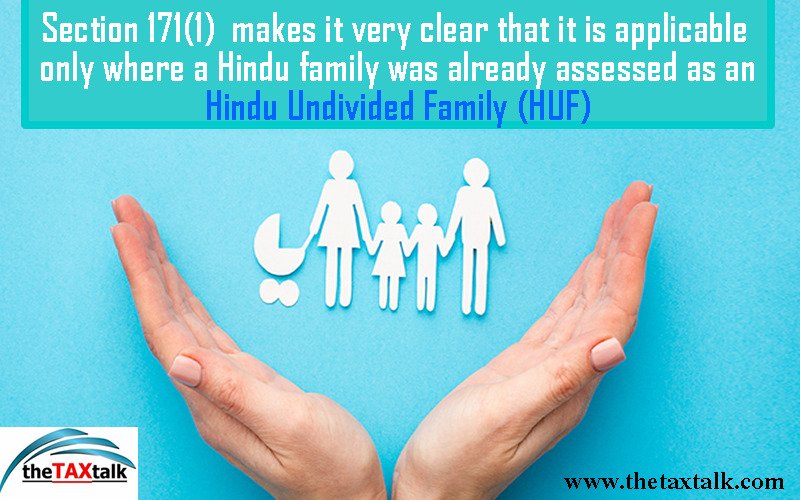![]()
Section 171(1) makes it very clear that it is applicable only where a Hindu family was already assessed as an Hindu Undivided Family (HUF)
Short Overview Where a Hindu family was never assessed as a HUF, section 171 will not apply even when there is a division or partition of property which does not answer to the definition of ‘partition’ in Explanation to section 171.
Assessee father Late A.R. Pandurangan was the absolute owner of agricultural lands. He left behind him, three sons and a daughter as legal heirs. At the time of death of the father an agricultural land measuring 6.28 acres in Ayanambakkam village and a house on a 8 ground of lands situated at Ayanambakkam village was available for being partitioned. Brothers and sisters being HUF co-parceners entered into oral partition and recorded the same in a Memorandum Share in the agricultural property was dividend in certain proportion and that land to an extent of 3 crores out of 6.28 acres was sold and sale proceeds was shared by each of the legal heirs of Late P.R. Andurangan. They also filed their respective IT returns and claimed exemption under section 54F from payment of long term capital gain tax. Notice, dated 12-3-2013 under section 263 was issued primarily on the ground that there was no physical division of property and, therefore, exemption under section 54 F on sale appeared to be contrary to section 171. Assessee being one of the co-parcener challenged the notice by way of writ petition.
It is held that A reading of sub- section 171 makes it very clear that it is applicable only where a Hindu family was already assessed as an Hindu Undivided Family (HUF). Otherwise, there is no meaning to the expression ‘hither to’ in section 171(1). It is only in the above circumstances, the definition of ‘partition’ in Explanation to section 171 is attracted. The above definition cannot be read in isolation. Where a Hindu family was never assessed as a HUF, section 171 will not apply even when there is a division or partition of property which does not answer to the above definition. In the instant case, admittedly, during the lifetime of Shir A.R. Pandurangan, the family was not assessed as a Hindu Undivided Family (HUF). It was only where there was a prior assessment as a Hindu Undivided Family (HUF) and during the course of assessment under section 143 or section 144 it was claimed by or on behalf of member of such Hindu Undivided Family which was assessed as a HUF that there was a partition whether total or partial among the members of such family. Accordingly, impugned notice was quashed as invalid.
Decision: In assessee’s favour.
IN THE MADRAS HIGH COURT
C. SARAVANAN, J.
A.P. Oree v. ITO
W.P. No. 41642 of 2016 and W.M.P. No. 35629 of 2016
2 June, 2021
Petitioner by: R. Sivaraman
Respondent by: Prabhu Mukunth Arunkumar Standing Counsel
ORDER

